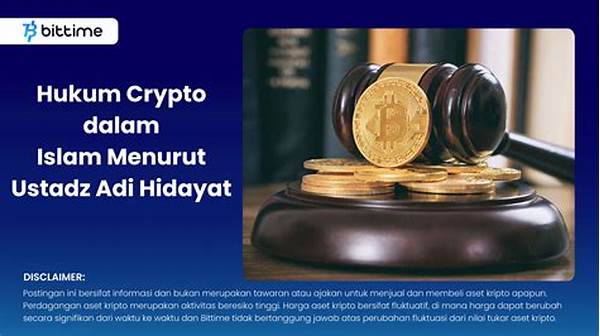Hukum Crypto Dalam Islam
Cryptocurrency is a digital marvel that has been stirring the world economy and creating waves of opportunity and controversy alike. Yet, when it comes to the Islamic perspective on the fast-evolving world of crypto, the question often asked is: What is the stance of Islamic law on this digital phenomenon? While crypto enthusiasts around the world are diving headfirst into this digital gold rush, many Muslim investors find themselves at a crossroads, contemplating the “hukum crypto dalam Islam” (Islamic law on crypto) before making their move.
Read More : The Blockchain Technique: A Powerful Way To Verify The Authenticity Of Digital Assets!
Islamic finance is not a new concept; it has provided ethical guidelines for financial dealings over centuries. In recent years, as digital currencies have gained traction, Islamic scholars and finance experts have convened to address the controversial issue of cryptocurrencies and their compliance or conflict with Shariah law. The primary concern is the principles of transparency and fairness, a crucial tenet in Islamic finance that seems to contradict the volatile and often unpredictable nature of cryptocurrencies. Are these digital assets as solid as they appear, or are they akin to gambling—a practice unequivocally forbidden in Islam? This question sets the stage for an intriguing exploration of whether crypto is halal (permissible) or haram (forbidden).
Economists and scholars have undertaken various analytical studies to understand whether cryptocurrencies can be integrated within the system of Shariah-compliant finance. Many argue that since cryptocurrencies derive value not from an intrinsic source but rather from speculative forecasting, they bear a likeness to gharar—an Arabic term for excessive uncertainty and risk, which is frowned upon in Islamic finance. Conversely, some scholars see the potential for these digital currencies to revolutionize and improve transparency in finance, offering a level of security and openness previously unheard of. As we delve deeper into the topic of “hukum crypto dalam Islam,” we’ll uncover whether this digital currency can stand the scrutiny of Islamic ethical doctrines.
Navigating Islamic Jurisprudence and Cryptocurrency
The Islamic ruling on cryptocurrencies is predominately derived from established Islamic finance principles, which emphasize ethical investment and social justice. Many Islamic nations and financial institutions are grappling with the influx of cryptocurrencies while staying loyal to Islamic law. As the discussion continues to unfold, the intersections of faith and the ever-evolving digital market pose many challenges, but also, potential breakthroughs.
—
Understanding the framework of “hukum crypto dalam Islam” requires a nuanced exploration of both Islamic finance and the mechanics of cryptocurrency. Both fields have their principles, and when they intersect, they create a fascinating dialogue filled with complex questions and ethical queries.
The first aspect of analysis is based on the foundational principles that govern Islamic finance. Islamic finance is characterized by a strict prohibition on riba (usury), a demand for ethical investments, and an aversion to excessive uncertainty or speculation—certainly an intricate landscape for any investment, let alone volatile cryptocurrencies. These core principles lead to varying interpretations when it comes to cryptocurrency. Some Islamic scholars argue that, owing to the lack of intrinsic value and volatile nature of these digital currencies, they resemble gambling, thus rendering them impermissible under Islamic law.
Yet, while the dominant narrative in many circles may skew towards crypto being viewed as haram, there is a growing conversation among modern scholars who are seeing the potential compatibility of certain cryptocurrencies with Shariah principles. They argue that not all cryptocurrencies are created equal, and some may meet the ethical requirements of Islamic finance better than others. These scholars highlight the importance of context and utility, suggesting that cryptocurrencies could be utilized as a tool to foster innovation and financial inclusivity within a framework that satisfies Shariah law. As such, there is hope within this school of thought that a balance can be struck, but definitive resolution hinges on the conclusions of ongoing examinations and rigorous scrutiny.
Cryptocurrency and Islamic Finance: A Potential Synergy?
This dynamic tension between innovation and tradition sets the stage for a potentially productive relationship between digital currency and Islamic finance. It’s a complex but exciting dialogue that could pave the way for future developments in the arena of Islamic financial instruments. As opinions and interpretations evolve, the world watches to see whether cryptocurrencies will carve out a valid space within the fabric of Islamic finance, underscoring an innovative synergy where tradition and technology meet harmoniously.
—
—
The concept of cryptocurrency has captivated the global financial markets, yet for those seeking to adhere to Islamic financial principles, it poses a myriad of complexities. Diving into the “hukum crypto dalam Islam,” one must appreciate not only the mechanics of digital currencies but also the ethical, social, and religious gravitas these considerations carry within the Muslim community. This path isn’t merely about financial gain, but rather understanding the intersections within Islamic tenets, providing a rich discussion steeped in traditional Islamic jurisprudence while skirting the enthusiasms of modern-day financial excitement.
Balancing Tradition with Innovation
For those who follow the Muslim faith, the question arises: Can cryptocurrencies be harmonized with the long-standing tenets of Islamic finance? With no central authority or tangible asset backing, cryptocurrencies pose a challenge to Islamic doctrines emphasizing real economic activity, promoting social justice and ethical exchange. Prominent Islamic scholars have rigorously debated the fluctuating nature of cryptocurrencies, often oscillating between perceiving them as potential assets and equating their volatility with the forbidden act of gambling. However, a deeper understanding of cryptocurrency highlights opportunities for implementation of Shariah-ed policies, supporting equal access and potential for global financial welfare—a potential breakthrough.
Ethical Investments in an Islamic Context
So, what does this mean for Muslims who are eager to enter the world of digital currency? It invites a new era of ethical considerations, where cryptocurrencies could be evaluated not only against economic advantages but ethical imperatives. As the dialog expands, it inspires a reevaluation of investment strategies and educates broader audiences about the essentials of balancing innovative investment with ethical commitment. Herein lies a vital conversation on digital cash fostering real economic benefit while honoring the spiritual safeguards that guide ethical Islamic finance.
—
Navigating the digital frontier through the lens of “hukum crypto dalam Islam” demands insightful understanding of crypto-systems and Islamic tenets. The illustrations above aim to provide a comprehensive guide and visual narrative, enabling audiences to succinctly grasp the intricate balance between tradition and technological advancement. Through visual storytelling, examine how the digital realm intersects with religious guidelines, and get entertained with humorous and insightful depictions, ensuring this complex topic becomes both accessible and engaging.




